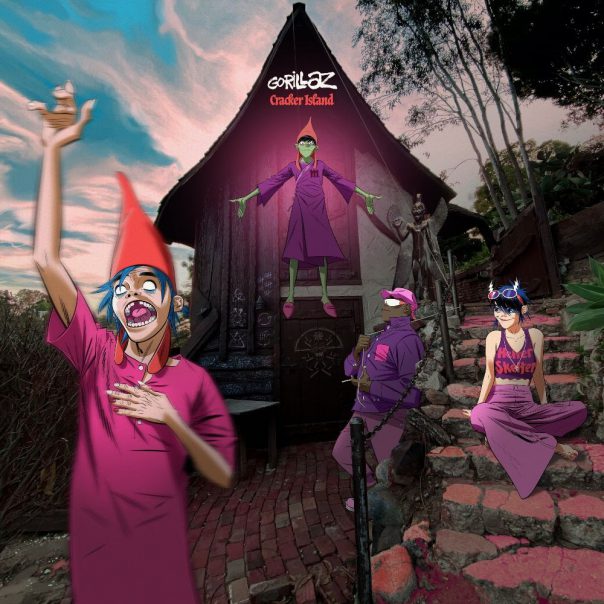ALBUM REVIEW: Gorillaz prepare a dispatch for the future on ‘Cracker Island’

Gorillaz, “Cracker Island.”
Centuries from now, historians will be desperate for an artifact that conveys what life was like during the twilight of Western civilization. People in the distant future will need help understanding our era’s anxious ennui. Cracker Island, the new album from Gorillaz—Blur vocalist Damon Albarn’s musical collaboration with visual artist Jamie Hewlett—will go a long way toward cluing future humans into what life was like in 2023.
Cracker Island
Gorillaz
Warner, Feb. 24
9/10
Get the album on Amazon Music.
Lyrically, the album is laser-focused on the isolation and commodification of our mostly virtual lives. Musically, it sparkles with a science-fictional gleam, bleeping and blooping with the digital toys the lyrics tell us are driving us mad.
The sumptuous synthesizers on “Silent Running” lock with spanky funk guitar, grooving in the great tradition of mannered British funk that runs from Bowie to Jamiroquai to Daft Punk. A lone human whistle delivers the intro’s melody amid a wash of synthesized sounds. If the song’s title is a reference to the criminally underrated 1972 ecology-themed space movie, the voyage described in Albarn’s lyrics isn’t outward in search of a planet on which to plant a bunch of trees, but a retreat into the inky black recesses of ourselves.
“Well, I got so lost here/ Machine-assisted, I disappear/ To a dream, you don’t wanna hear/ How I got caught up in nowhere again,” Albarn sings.
As has come to be expected, Albarn and company have assembled a who’s who of guest stars for Cracker Island, including Stevie Nicks, Thundercat, Bad Bunny, Beck, Tame Impala and Pharcyde rapper Booty Brown.
The album’s standout track, “New Gold,” suggests February is not too early to start thinking about the song of the summer for 2023. The absolute banger was cowritten by Tame Impala’s Kevin Parker and Brown. Like all of the greatest Gorillaz hits, the tune moves effortlessly between musical modes: from cloud-like synths and dreamy vocals to gritty hip-hop drums and soaring keyboard lines.
Raps Brown: “Trending on Twitter’s what some of us live for/ Friendships givin’ out, fucking revolving door/ All of this a joke? Pauly Shore/ Bullshit keeps comin’, maybe I’m a matador/ What are we living for?”
It’s kind of like Groundhog Day: If the song’s breezy hooks, digital ear candy and incisive lyrics create an appropriate score as the days warm up, we are in for a fantastic summer.
Stevie Nicks’ signature raspy vocals double up the vocal melody with Albarn on “Oil.” The duo calls listeners to action at the end of the song, singing in unison, “Individual actions change the world.” Bad Bunny joins Albarn on “Tormenta” adding some Auto-Tuned and reggaeton-inspired flavor to the song’s delicate piano and harp.
True to the animated characters and visual vibe created by Jamie Hewlett, much of the music feels like a comic book: striking, dramatic, stark and engaging. Songs like “The Tired Influencer,” “Tarantula” and “Baby Queen” invoke the carnivalesque psychedelia of The Flaming Lips.
“Skinny Ape,” a song Albarn debuted during the band’s most recent appearance in San Francisco, begins with a delicate acoustic guitar before it’s subsumed by a synthetic groove. The musical dynamic seems to recapitulate our experience as digital primates, out of place in a world where our computerized creations now threaten to replace us as we spend more and more of our time expending real emotions on a virtual world.
“Don’t be sad for me (ape)/ I’m a cartoon G (ape)/ And my intent is to breath (ape)/ In a new world, don’t be sad for me,” Albarn sings.
More than any other album I’ve heard recently, Cracker Island captures our current sense of irreality: that feeling that our lives are becoming less substantial, like we’re just lucid dreaming in front of a series of screens. On “Possession Island,” Albarn and Beck sing, “Where things they don’t exist/ And we’re all in this together ’til the end/ ‘Til the end.” It’s as if the only thing we’ve learned from our wired connections during Covid is how deeply alone we all feel, together.
Follow writer David Gill at Twitter.com/saxum_paternus.
